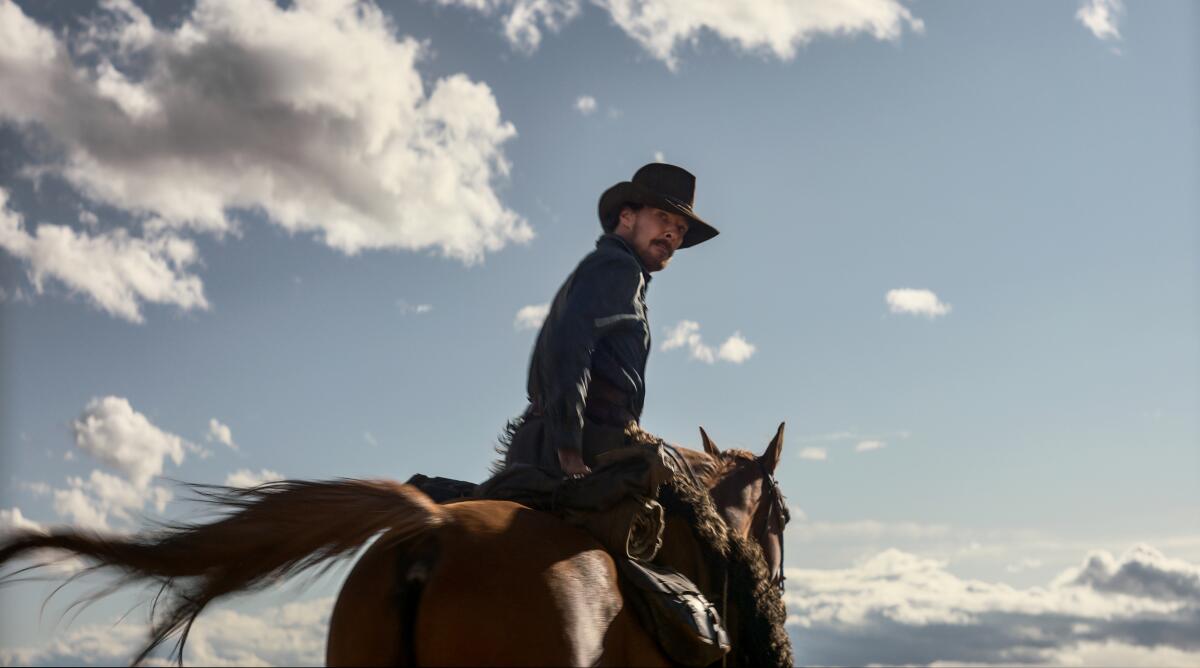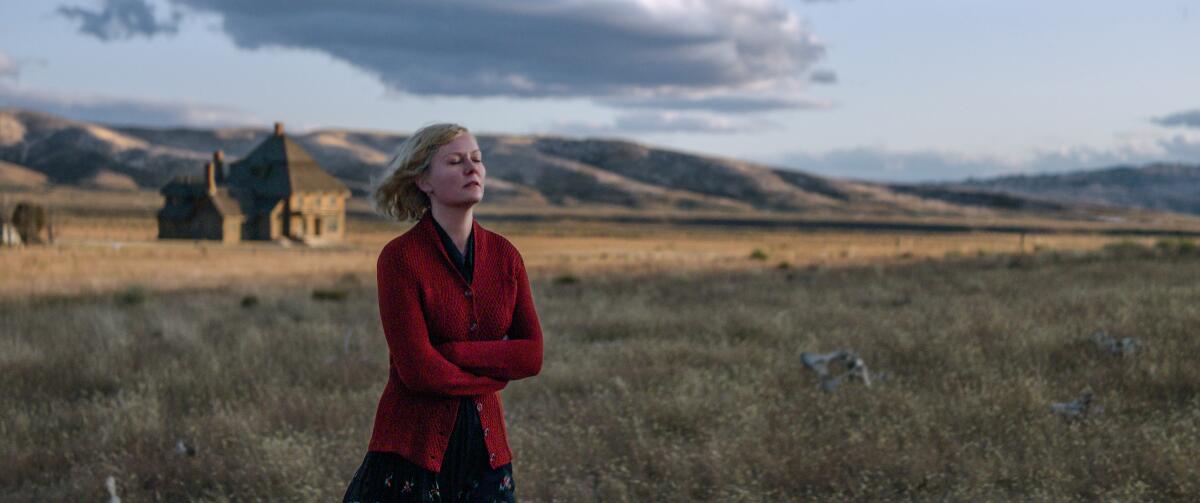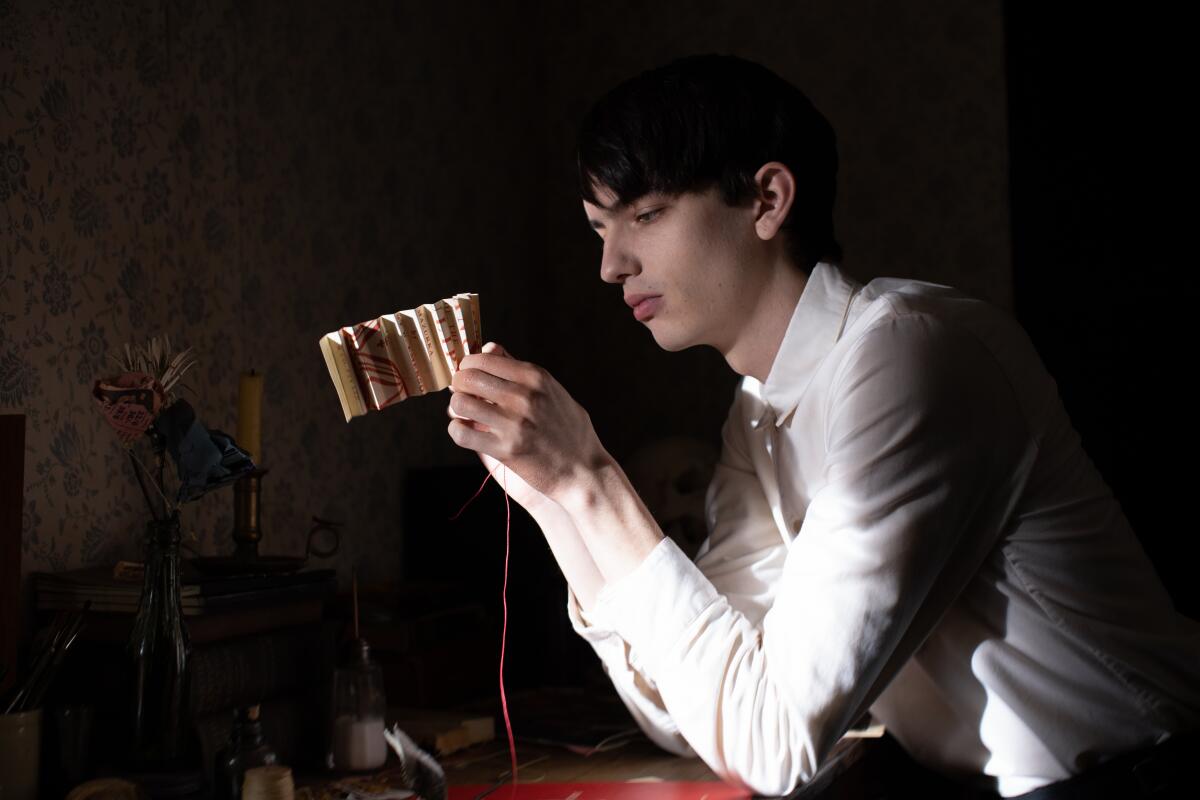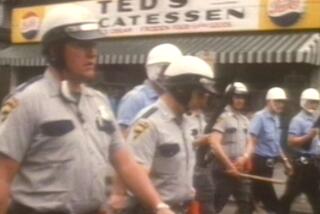Review: ‘Power of the Dog’ reasserts Jane Campion’s mastery and reveals a new side of Benedict Cumberbatch

The Times is committed to reviewing theatrical film releases during the COVID-19 pandemic. Because moviegoing carries risks during this time, we remind readers to follow health and safety guidelines as outlined by the Centers for Disease Control and Prevention and local health officials.
Phil Burbank is a 1920s rancher, a born rider of horses and a skilled leader of men. He is also a sadist, a master of psychological abuse and, as played by a monstrous, mesmerizing Benedict Cumberbatch, one of the scariest characters you may encounter in a movie this year. For all that, he may be less scary than he is proud, reveling in his dominion over the land and its creatures great and small. He especially prides himself on having the gift of sight, an ability to see things that others cannot, like the strange, elusive vision cast by shadows in the hills near his Montana ranch. “There is something there, right?” one of his men asks. Phil replies, “Not if you can’t see it, there ain’t.”
The mystery of the seen and unseen lies at the heart of “The Power of the Dog,” Jane Campion’s brilliantly acted, insidiously gripping adaptation of Thomas Savage’s 1967 novel. Like that book, it’s predicated on several carefully concealed surprises, what contemporary discourse would refer to as spoilers but are better understood as ingenious tricks of perception. There is so much to see in this movie, with its sunrise cattle drives set against somber gray skies and craggy landscapes. (Ari Wegner’s majestic cinematography cries out to be viewed in one of the theaters where the movie will be playing before it hits Netflix on Dec. 1.) But there is also a great deal hidden in plain sight, including that these Montana wilds were actually filmed in Campion’s native New Zealand, which feels curiously fitting in a movie about the deceptive nature of appearances.
At first glance, Phil and his brother, George (Jesse Plemons), are a model of sibling functionality, running their ranch in the absence of their city-dwelling parents (Frances Conroy and Peter Carroll). Their differences are pronounced and, for the most part, complementary. In a movie where dogs are both essential workers and potent symbols, Phil is clearly an alpha: Like his revered mentor, Bronco Henry, whose memory he clings to like a talisman, he’s a man of the earth, forever dirtying and bloodying his hands and washing only occasionally in a nearby river. George, whom Phil calls “fatso,” is his gentlemanly opposite, always freshly bathed, neatly dressed and unfailingly polite. The two share a no-nonsense sibling intimacy, but the air between them is charged with tension, the unspoken sense that even the slightest jolt might cause their fragile dynamic to collapse.
That jolt arrives when the Burbank brothers and their men stop at an inn and restaurant run by a widow named Rose Gordon (Kirsten Dunst) and are waited on by her soft-spoken son, Peter (Kodi Smit-McPhee). In a chain of events that unfold with exquisitely modulated tension, Phil takes one look at the intricately cut paper-flower decorations on the dinner table — and at the trim, elegant-mannered young man who designed them — and unleashes a string of insults. The withering attack on her son causes Rose to burst into tears, which George is there to wipe away. Swiftly but sincerely, his consolation becomes something more, and the two are soon married — a decision that infuriates Phil, in part because he knows he has only himself to blame.

Campion has judiciously pared down Savage’s text — Rose’s first husband, still alive in the early chapters of the novel, has been dead four years as the movie opens — and splintered the narrative with chapter breaks that quicken rather than segment its gathering momentum. The story hits its stride when Peter heads off to college to study medicine and Rose moves onto the Burbanks’ ranch, where George does what he can to make her feel at home and Phil does the opposite. Campion knows a thing or two about new brides in hostile surroundings, and admirers of her 1993 triumph, “The Piano,” may smile when George thoughtfully buys Rose a baby grand as a present. (Fans of Dunst and Plemons, a real-life couple, will also be warmed by the fleeting moments of happiness that Campion grants them in their on-screen marriage.)
But Rose’s love of the piano is snuffed out, along with her spirit, as Phil’s quietly domineering presence spreads through the house like a toxic vapor, filling its dim, cavernous spaces until they feel as vast and unsettled as the surrounding prairies. In one sense, Campion, worthy winner of the director prize at the recent Venice International Film Festival, turns the conventions of her presumed genre inside out. “The Power of the Dog” is a psychological thriller in the guise of a western, and possibly a love story in the guise of a psychological thriller. Everything about it, from the spare, enveloping details of Grant Major’s production design to the nerve-shredding dissonances of Jonny Greenwood’s score, directs our focus inward.
Its most striking landscapes may be the faces of its four extraordinary actors. The camera lingers on the mix of caution and reserve at play in Smit-McPhee’s gaunt, delicate features, which can hide quite a lot, and also the mix of decency and helplessness in Plemons’ softer visage, which here hides almost nothing. Dunst, meanwhile, twists her countenance into a mask of pain and desolation as Rose shrinks under the weight of Phil’s serial humiliations and descends into alcoholism, partaking of the booze she had earlier disavowed. (The movie begins in 1925, a year before Montana became the first state to repeal enforcement of Prohibition.)
And then there’s Cumberbatch, as magnetic in horseback-riding long shot as he is in glowering closeup. The rugged frontiersman is not the first role in which you might cast an actor known for his clean-shaven elegance and British schoolmaster’s diction, but Cumberbatch, in a performance that merges steely intelligence and fearless physicality, makes you wonder why no one thought of it sooner. And yet he draws as much on his own screen history as he seems to depart from it. You get a sense of this when Phil makes an early speech likening himself and his brother to Romulus and Remus; he’s more erudite than his chaps and spurs and coarse habits let on, which is disquieting in itself. His loathing of Rose and Peter seems to spring from something deeper and more vindictive than standard roughneck ignorance.

But that vindictiveness seems to retreat — or is it deepening? — when Peter returns from school to visit his mother and, against all odds, begins to forge an odd kinship with his former tormenter. Is Phil taking the young man under his wing out of a change of heart or simply keeping his enemy close? The ambiguity of motive is fascinating; for the first time, he seems to have encountered someone whose gaze might be as penetrating as his own. Peter is no longer cutting paper flowers; he’s dissecting small animals for his studies, with the clinical dispassion his profession demands. The precision of his movements might remind you of Phil’s own surgical dexterity as he braids together a rope — a task that requires strength and stamina but also delicacy and coordination. It’s also a fine visual metaphor for the way the strands of this story are pulled tautly, inexorably together.
It’s that near-tactile attention to detail that makes Campion’s signature so distinct, especially in a genre more inclined toward big-picture sweep. She has always been particularly sensitive to her characters’ hands and handiwork: the virtuoso skill with which Holly Hunter tickles the ivories in “The Piano,” but also the ardor with which Abbie Cornish’s fingers clasp a love letter in the ravishing 19th-century romance “Bright Star.” Campion has spent her career probing the complex inner worlds of these and other women, giving vivid expression to desires they are often forced to subsume or repress. It comes as little surprise that her insight into the gnarled codes and contradictions of American masculinity is no less piercingly astute.
“The Power of the Dog” is Campion’s first feature in the 11 years since “Bright Star” (she co-directed and co-wrote two seasons of the crime drama series “Top of the Lake” in the meantime), and it marks a triumphant return to the form, a nervy gamble that becomes a reassertion of her mastery. This stretch of Montana may be new geographical territory, but nothing about its mysteries and undercurrents feels alien to a filmmaker who has always been most at home out in the open.
Campion handles the story with puzzle-box precision, but the power of this movie goes beyond its clockwork plotting and startling, deeply satisfying denouement. It lingers in those tense moments when Phil, so proud of his foresight and yet so blind to human consequences, catches a too-late glimpse of what lies on the horizon. More than once, Campion frames him through a barn doorway or a window, trapping him against a landscape that suddenly looks as small, as finite, as he does. He’s no longer terrifying; he’s terrified.
‘The Power of the Dog’
Rating: R, for brief sexual content/full nudity
Running time: 2 hours, 8 minutes
Playing: Starts Nov. 17 at Laemmle Playhouse 7, Pasadena; Los Feliz Theater, Los Feliz; the Landmark, West Los Angeles; Bay Theatre, Pacific Palisades; available Dec. 1 for streaming on Netflix
More to Read
Only good movies
Get the Indie Focus newsletter, Mark Olsen's weekly guide to the world of cinema.
You may occasionally receive promotional content from the Los Angeles Times.











